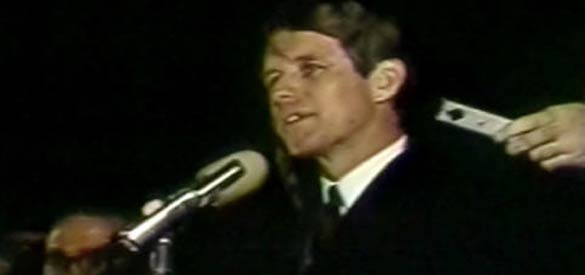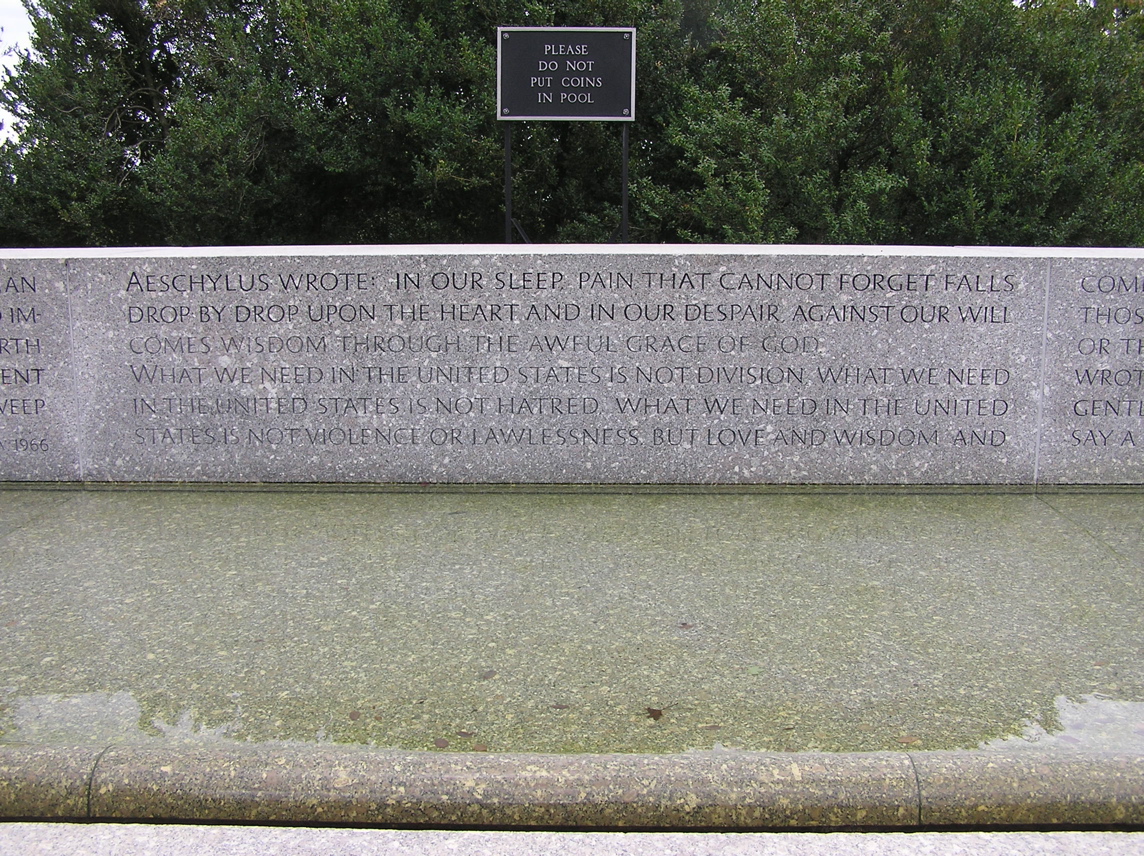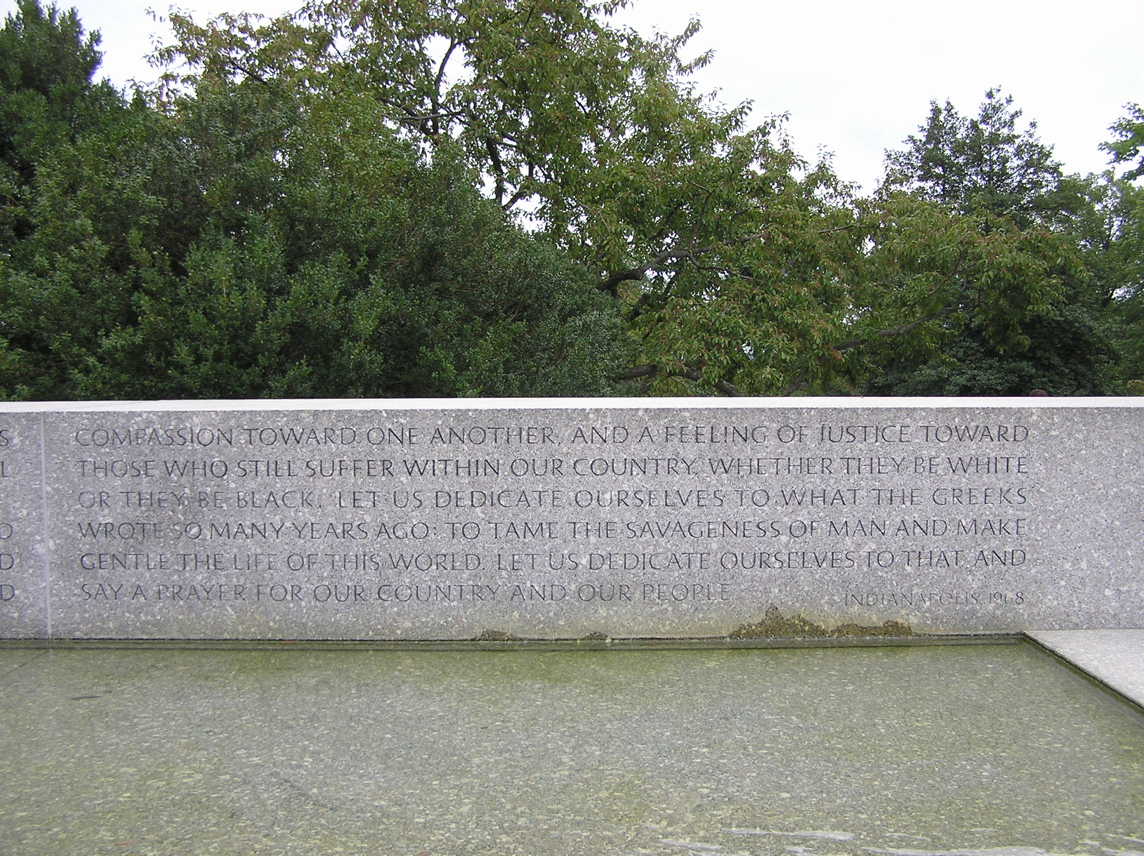JFKMLKRFK.com is best viewed on a desktop/laptop, not a cell phone. New layout coming in 2025.
new: MLK holiday Jan. 20, 2025 is inauguration day for the insurrectionist.
RFK's speech upon hearing Martin Luther King had been killed
April 4, 1968 - Indianapolis, Indiana www.youtube.com/watch?v=BCrx_u3825g
- RFK - April 4, 1968
- How My Grandfather, RFK, Stopped a Riot - The greatest leadership speech ever made?
Robert F Kennedy - April 4, 1968 - Indianapolis
 I have some very sad news ... and that is that Martin Luther King was shot and killed tonight.
I have some very sad news ... and that is that Martin Luther King was shot and killed tonight.
Martin Luther King dedicated his life to love and to justice between his fellow human beings, and he died in the cause of that effort.
In this difficult day, in this difficult time for the United States, it is perhaps well to ask what kind of a nation we are and what direction we want to move in.
For those of you who are black—considering the evidence there evidently is that there were white people who were responsible--you can be filled with bitterness, with hatred, and a desire for revenge. We can move in that direction as a country, in great polarization--black people amongst black, white people amongst white, filled with hatred toward one another.
Or we can make an effort, as Martin Luther King did, to understand and to comprehend, and to replace that violence, that stain of bloodshed that has spread across our land, with an effort to understand compassion and love.
For those of you who are black and are tempted to be filled with hatred and distrust at the injustice of such an act, against all white people, I can only say that I can also feel in my own heart the same kind of feeling. I had a member of my family killed, but he was killed by a white man.
But we have to make an effort in the United States, we have to make an effort to understand, to go beyond these rather difficult times.
 My favorite poet was Aeschylus. He wrote: "In our sleep, pain which cannot forget falls drop by drop upon the heart until, in our own despair, against our will, comes wisdom through the awful grace of God."
My favorite poet was Aeschylus. He wrote: "In our sleep, pain which cannot forget falls drop by drop upon the heart until, in our own despair, against our will, comes wisdom through the awful grace of God."
What we need in the United States is not division; what we need in the United States is not hatred; what we need in the United States is not violence or lawlessness; but love and wisdom, and compassion toward one another, and a feeling of justice toward those who still suffer within our country, whether they be white or whether they be black.
 So I shall ask you tonight to return home, to say a prayer for the family of Martin Luther King, that's true, but more importantly to say a prayer for our own country, which all of us love--a prayer for understanding and that compassion of which I spoke.
So I shall ask you tonight to return home, to say a prayer for the family of Martin Luther King, that's true, but more importantly to say a prayer for our own country, which all of us love--a prayer for understanding and that compassion of which I spoke.
We can do well in this country. We will have difficult times; we've had difficult times in the past; we will have difficult times in the future. It is not the end of violence; it is not the end of lawlessness; it is not the end of disorder.
But the vast majority of white people and the vast majority of black people in this country want to live together, want to improve the quality of our life, and want justice for all human beings who abide in our land.
Let us dedicate ourselves to what the Greeks wrote so many years ago: to tame the savageness of man and make gentle the life of this world.
Let us dedicate ourselves to that, and say a prayer for our country and for our people.
http://www.politico.com/magazine/story/2016/04/rfk-speech-mlk-riot-kick-kennedy-213790
How My Grandfather, RFK, Stopped a Riot: Forty-eight years ago today Robert F. Kennedy gave one of the great healing speeches in American history.
By KICK KENNEDY April 04, 2016
On this day in 1968, my grandfather, Robert F. Kennedy, shared the tragic news of Dr. Martin Luther King Jr.’s death with a crowd in downtown Indianapolis. It was the era before instant information. Most of the crowd had not heard the news. Some had. And some of these arrived with clubs and chains, preparing to riot. Mayor Richard Lugar had warned Kennedy not to speak. The local Indianapolis police refused to escort him into the ghetto. It was too dangerous, they told him. But after consulting civil rights leader John Lewis, who had organized the rally, Robert Kennedy went unguarded to address the crowd.
Thirty-four cities rioted that night. Indianapolis was the only American city with a large black population that did not. I think that outcome—which observers at the time attributed at least in part to RFK’s calming presence and above all his message—still have a great deal of relevance for where our country is today, 48 years later. ....
http://vault.theleadershiphub.com/blogs/robert-kennedy-greatest-leadership-speech-ever-made
Robert Kennedy. The greatest leadership speech ever made?
by Phil Dourado March 28, 2008
....
The Story Behind the Speech
John Kotter - professor of leadership at Harvard - says that he showed a video clip of this speech at a conference he was talking at. A member of the audience came forward at the end and explained that the speech was only half the act of leadership Kennedy carried out that night that stopped the violence in one part of the States at least.
After stepping off the plane at Indianapolis, and before giving the speech captured in the Hub TV video clip, Kennedy had gathered together the 100 or so volunteer campaign stewards who were there to help organize the event and told them Dr. King was dead and that he was going to tell the crowd. One of the young stewards was the man attending Prof. Kotter's seminar: he had been there.
Their task, said Kennedy to his young volunteers, was to go out into the centre of Indianapolis after he had talked to the crowd, and look for people out on the streets who were raging over Dr. King's death, and to console them, to counsel them. Kennedy explained that he couldn't tell them what to say because he didn't know himself what he was going to say that night.
He also said that he realized this was not what they had signed up for when they volunteered to help him make a campaign speech and that it could be dangerous, so they should feel free to leave with a clear conscience. Only two of the hundred or so young people walked away.
Kennedy then went up onto his flatbed truck, and his peace emissaries dispersed to join the crowd.
A nearly-President who quotes, off the top of his head, his favourite poet, Aeschylus, and who asks the people to follow the lead of the Ancient Greeks. And thereby prevents a night of violence. What a President he might have been.
related websites:




JFKMLKRFK.com - by Mark Robinowitz - updated
January 13, 2025